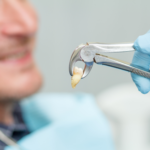Reaching your 60s is a fantastic milestone, bringing wisdom, experience, and hopefully, plenty of reasons to smile! But as the years advance, so do the unique needs of your oral health. Keeping your teeth strong and healthy after 60 requires a proactive approach and an understanding of the changes that can occur. This comprehensive guide will walk you through essential senior dental care practices to ensure your smile stays bright and your overall health thrives.
Why Senior Dental Care Demands Extra Attention
While a good oral hygiene routine is crucial at any age, seniors face specific challenges that can impact their dental health. These include:
- Dry Mouth (Xerostomia): Often a side effect of medications, certain medical conditions, or aging itself, dry mouth reduces saliva flow. Saliva plays a vital role in washing away food particles, neutralizing acids, and preventing decay.
- Gum Recession: Gums can naturally recede with age, exposing the tooth roots. These roots are softer than enamel and more susceptible to sensitivity and decay.
- Increased Risk of Tooth Decay: Changes in diet, difficulty with brushing and flossing due to arthritis or other mobility issues, and dry mouth can all contribute to a higher risk of cavities.
- Wear and Tear: Years of chewing can lead to the gradual wearing down of tooth enamel, increasing the risk of chips, cracks, and sensitivity.
- Denture Care: Many seniors rely on dentures, which require proper cleaning and maintenance to prevent infections, gum irritation, and discomfort.
- Link Between Oral and Systemic Health: Research increasingly highlights the connection between oral health and overall well-being. Poor dental health in seniors has been linked to conditions like heart disease, diabetes, and respiratory infections.
Key Practices for Keeping Your Smile Healthy After 60
Maintaining strong teeth and healthy gums as a senior involves a combination of diligent at-home care and regular professional checkups. Here’s what you can do:
- Brush Gently and Effectively: Use a soft-bristled toothbrush and fluoride toothpaste to brush your teeth at least twice a day for two minutes. If you have difficulty gripping a standard toothbrush, consider an electric toothbrush with a larger handle. Remember to brush all surfaces of your teeth.
- Floss Daily: Flossing removes food particles and plaque from between your teeth and along the gumline, 1 areas your toothbrush can’t reach. 2 If traditional floss is challenging, try floss picks or interdental brushes. 1. sandtondentalclinic.co.za sandtondentalclinic.co.za 2. www.drcaradental.com www.drcaradental.com
- Stay Hydrated: Drink plenty of water throughout the day to combat dry mouth and help rinse away food debris.
- Manage Dry Mouth: If you experience dry mouth, talk to your dentist or doctor. They may recommend saliva substitutes, sugar-free lozenges, or changes to your medication.
- Consider Fluoride Treatments: Your dentist may recommend in-office fluoride treatments or prescribe a high-fluoride toothpaste to strengthen enamel and prevent decay.
- Maintain a Healthy Diet: Limit sugary and acidic foods and drinks, which can erode enamel and contribute to cavities. Focus on a balanced diet rich in fruits, vegetables, and whole grains.
- Proper Denture Care (If Applicable): Clean your dentures daily with a denture brush and cleanser. Soak them overnight in a denture solution. Never use regular toothpaste on dentures, as it can be too abrasive. Schedule regular checkups with your dentist to ensure your dentures fit properly and are in good condition.
- Be Aware of Medications: Inform your dentist about all medications you are taking, as some can have oral health side effects.
- Quit Smoking: Smoking significantly increases the risk of gum disease, tooth loss, and oral cancer. Quitting is one of the best things you can do for your overall and oral health.
The Crucial Role of Regular Dental Checkups
Even with excellent at-home care, regular visits to your dentist are essential for senior dental care. Your dentist can:
- Detect Problems Early: Routine checkups allow for the early detection of cavities, gum disease, oral cancer, and other issues, when they are often easier and less expensive to treat.
- Provide Professional Cleanings: Dental hygienists can remove plaque and tartar buildup that you can’t eliminate with brushing and flossing alone.
- Monitor Changes: Your dentist can monitor any changes in your oral health over time and recommend appropriate preventive or restorative treatments.
- Address Specific Concerns: Don’t hesitate to discuss any concerns you have about your teeth, gums, or dentures with your dentist.
Investing in Your Smile, Investing in Your Health
Maintaining strong teeth and healthy gums after 60 is an investment in your overall well-being and quality of life. By understanding the unique needs of senior dental care and adopting proactive habits, you can enjoy a comfortable, confident smile for many years to come. Schedule regular checkups with your dentist and embrace these tips for a healthier, happier you!








